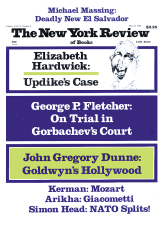In response to:
1588 and All That from the February 16, 1989 issue
To the Editors:
In case any of your readers should be misled, I ought to put right some misreadings or misunderstandings in J.R. Hale’s recent review of my and other Armada books [NYR, February 16], and demur at a serious accusation he makes against me.
First, Hale appears to misunderstand Colin Martin’s and Geoffrey Parker’s argument about gun carriages. They show not that the Spaniards depended on land carriages but that Spanish sea carriages were unhandy, My remark on land carriages, quoted by Hale, was not therefore intended as a rebuke to Colin Martin, with whom I agree on this point. I differ from him and Parker in this connexion only in my unwillingness to regard technical disparities between the fleets as decisively influencing the outcome of the campaign.
Secondly, Hale was rash, I think, to challenge the judgement of Oxford University Press editors on a lexical point. They let me call my book an “essay” because that is what it is: a reflective, discursive and tentative work, clearly distinct from the narrative accounts with which Hale confuses it.
Thirdly, I nowhere “state” the purpose Hale ascribes to me. On the contrary, on p. vii I say that “my purpose has not been to tilt at creaking windmills of bygone myth.” My quarrel with chauvinistic English Armada traditions is confined to a few pages of the preface and was inspired—as I hope most readers will believe—not by “counterbias” or “xenophobia” but by an honest attempt at a light-hearted and dispassionate corrective. If Hale finds the result tendentious, ineffective writing or inattentive reading may be to blame. I am so thoroughly anglicised that my animadversions on the English are more likely to be self-deprecatory than xenophobic.
Felipe Fernández-Armesto
St. Antony’s College
Oxford, England
John Hale replies:
I suggested that to call a heavy-handed work of three hundred pages an “essay” was an affectation. Mr. Felipe Fernández-Armesto says that his publisher, Oxford, could not have allowed him to be in error on a lexical point. In the Oxford Dictionary of Current English “essay” is defined as “a short prose composition on a subject.”
When I wrote that “He states that the purpose of his ‘essay’…is to argue against ‘the English tradition’ of Armada history,” I was following his own (p. v) “The English tradition…has been typified by some fairly loathesome chauvinism and by a pride in achievement unjustified—as I propose to argue—by the facts.” It is true that he later goes into reverse (p. vii) by claiming that his purpose “has not been to tilt at creaking windmills of bygone myth.” His readers will decide which essayist they are dealing with.
In my excursus on gun mountings I should have inserted “versions of” before my first reference to land carriages, and I am glad to have been redirected to my treatment of this issue. As for his own remark, it would have been helpful if he had provided a reference for “the suggestion that many Spanish guns may have been mounted on land carriages.”
This Issue
May 18, 1989



